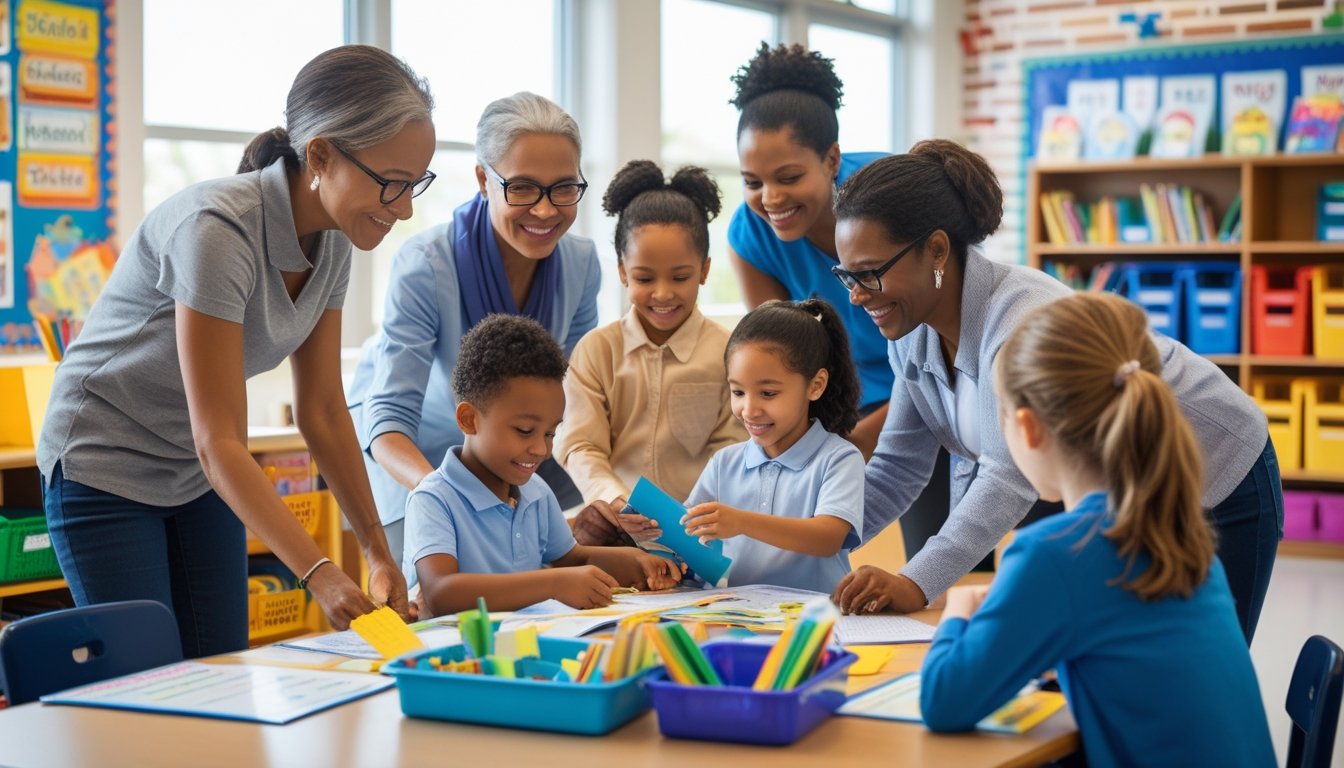Late updated: 07 Oct 2025 09:10
Written by:
The Role Of Parent Volunteers In Schools: Enhancing Educational Experience
Parent volunteers serve as invaluable assets within school communities. Their involvement contributes to enhanced communication with teachers, positive role modelling, and a boost in students' confidence. Research highlights that children of parent volunteers often achieve better grades and display improved behaviour. With these benefits in mind, it's clear how essential parent volunteers are to a modern educational environment.

By participating actively in school activities, parents help bridge the gap between home and educational settings. This presence enriches students' learning experiences by providing additional resources and perspectives. As we explore the role of parent volunteers in schools, we invite you to consider how such engagement impacts student success and fosters a strong school community.
Schools, as communal spaces, thrive on the collective efforts of teachers, staff, and parents. As we delve into the specific responsibilities and the widespread impact of parental involvement, it's important to recognise how these dynamics enhance both students' academic journey and the school environment. By the end of this exploration, we aim to leave you inspired on how we can support such vital contributions in our own school communities.
Key Takeaways
- Parental involvement enhances student grades and behaviour.
- Parents contribute additional resources and perspectives.
- Volunteers strengthen school and community bonds.
Core Responsibilities Of Parent Volunteers In Schools

Parent volunteers are integral in supporting educational environments, assisting both in classrooms and during school-wide events. Their involvement enhances the connection between families and schools, leading to enriched educational experiences and a stronger community dynamic.
Supporting Teachers And Classroom Activities
Parent volunteers often provide invaluable support to teachers by participating in classroom activities. They might assist with small group reading sessions, oversee art projects, or help manage classroom supplies. This assistance allows teachers to dedicate more time to instruction and individual student needs.
Additionally, these volunteers can provide extra attention to students who may benefit from additional help. Their presence in the classroom fosters a collaborative atmosphere, whereby teachers can implement more dynamic and engaging lesson plans. By supporting classroom management, volunteers also contribute to maintaining an organised and efficient learning space.
Participating In School Events And Programmes
Involvement in school events and programmes represents another key responsibility. Parent volunteers help organise school fairs, sports days, and fundraising activities, providing essential manpower and creative input. Their participation ensures these events run smoothly and are successful.
Moreover, these activities present opportunities for parents to bond with students and staff outside the classroom setting, strengthening the sense of community. Engaging in school programmes also allows parents to share their skills and talents—whether in art, music, or sport—enhancing the diversity of experience offered to students.
Enhancing Communication And Liaison With The School Community
Parent volunteers serve as a bridge between families and school administrations, facilitating better communication. In this role, they may assist with coordinating parent-teacher meetings or distributing newsletters and announcements.
These efforts ensure that families stay informed and engaged with school developments and initiatives. By championing open lines of communication, volunteers help create a welcoming environment where parents feel valued and encouraged to participate actively. This liaison role is crucial for fostering a cohesive and supportive school community where everyone's contributions are recognised and appreciated.
The Impact Of Parent Volunteers On Student Success And School Engagement
Parent volunteers in schools play a crucial role in enhancing student achievement and engagement. Their involvement can foster academic growth, strengthen parental engagement, and create a seamless learning experience between home and school.
Fostering Academic Achievement And Student Learning
Our schools benefit greatly from active parent volunteers. Increased involvement leads to higher academic performance and student success. When parents participate in educational activities, students are motivated to achieve more.
Engaged parents can take part in classroom activities, assist teachers, or organise educational events. These contributions provide students with extra resources and support. Students perceive education as a shared responsibility among parents, teachers, and themselves.
This participation also heralds an improved focus on learning, which helps in tracking academic progress and identifying areas for improvement. As a result, students have higher self-esteem and a more positive attitude towards their studies.
Strengthening Parental Involvement And Engagement
Parental involvement creates a robust partnership between parents and schools. This collaboration occurs through communication, shared goals, and a mutual interest in student success. When parents volunteer, it encourages open dialogue with teachers.
Such relationships facilitate effective collaboration. The involvement instils confidence in students, fostering a supportive school environment. Parents also get insights into the educational process, helping them actively participate in their child's academic journey.
Engagement in school activities enables parents to feel more connected and builds a strong community ethos. By working together, we can ensure that our children receive the best possible education with committed family support.
Bridging Learning At Home And At School
Parent volunteers serve as a crucial link between school and home environments. They ensure that educational values and practices are consistent, both in classrooms and at home. This synergy enhances student learning and success.
When parents are informed about school activities and curricula, they can reinforce learning at home. This approach ensures that students are supported in homework and school projects. It provides continuity in learning, leading to better understanding and retention.
Connecting learning environments fosters a holistic approach to education. We can create an environment where students feel supported and motivated. Engaged parents lead to engaged students who are better equipped to succeed academically.
Frequently Asked Questions

The involvement of parent volunteers in schools is essential for providing support and fostering a sense of community. Here, we address key questions about the responsibilities, impact, and management of parent volunteers.
What responsibilities do parent volunteers typically undertake within schools?
Parent volunteers often help with classroom activities, assist teachers with administrative tasks, and organise school events. They might also participate in extracurricular activities or provide one-on-one support to students needing additional guidance.
How does the involvement of parent volunteers impact student outcomes?
Research highlights improvements in student behaviour, grades, and attendance when parents are active volunteers. Their presence can boost student confidence and encourage communication between teachers and families, leading to positive educational experiences.
What processes do schools have in place to recruit and train parent volunteers?
Many schools conduct orientations to familiarise volunteers with school policies and expectations. Training sessions may include workshops on effective communication and strategies for engaging students. Recruitment often involves clear communication through newsletters, meetings, and school websites.
In what ways do parent volunteers contribute to the school community?
Parent volunteers offer invaluable support by increasing manpower and resources. They serve as positive role models and create a welcoming atmosphere for students. This sense of community facilitates stronger relationships between families, educators, and pupils.
What are the safety and safeguarding considerations for parent volunteers working in schools?
Schools typically conduct background checks to ensure the safety of students. Volunteers are usually given guidelines on maintaining consistent discipline and respecting the privacy of students. Training on safeguarding policies is often mandatory, to ensure a secure environment for all involved.
How can schools foster long-term engagement with parent volunteers?
To maintain volunteer engagement, schools can offer flexible opportunities that accommodate parents' schedules. Recognising contributions and creating avenues for feedback can enhance satisfaction. By fostering open communication and appreciation, schools can build lasting partnerships with parent volunteers.
